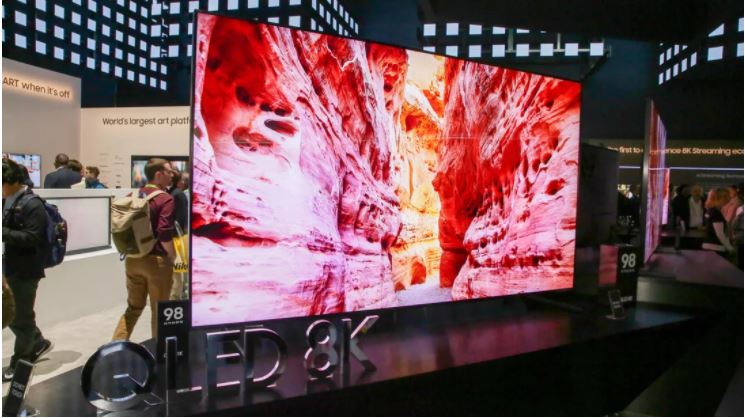Just when you were getting used to the idea of TVs with 4K resolution, here comes 8K. In 2019, the first 8K TVs went on sale, and right now in 2020, you can choose from multiple 8K TVs, with more on the way later this year. Manufacturers like Samsung, Sony, LG, and TCL are doing their best to convince you that an 8K TV is worth the investment. And it's quite an investment, currently more than $2,700 for a 65-inch 2020 Samsung.
Price is one reason why we're still years away from 8K TVs being commonplace. "On a unit basis, we don't expect 8K to exceed 1% of volume until 2022," Stephen Baker, vice president of Industry Analysis at NPD Group, said in December 2019. "8K will migrate down in price, but it will face a stiffer challenge than 4K, for example, as the price points and the market for very large TVs are now highly established and very price competitive." The economic fallout from the coronavirus pandemic could push the adoption of 8K TVs even further into the future.
But the day will come when 4K and 8K go the way of all those lower resolutions and are replaced by a bigger number. Does this mean 4K TV is already obsolete? Do you need to rush out and buy an 8K TV or risk being unable to watch your favorite shows? Do you need an 8K TV for the PlayStation 5 or Xbox Series X?
The answer to all of these questions is "no." Here's why.
8K TV buying advice: Don't
Before we get into the nitty-gritty, here's a quick summary of our current thinking regarding 8K TVs.
- Unless you have money to burn, don't even consider buying one right now.
- From what we've seen, there's very little image quality improvement over 4K TVs.
- Any image quality improvement we've seen required sitting very close to a very large screen.
- To get the most out of any 8K TV, you need actual 8K content.
- There's basically no 8K content (movies and TV shows) available right now and little prospect of any in the next year.
- Both new consoles promise 8K resolution, but that's potentially very misleading.
- In the next few years, 8K TVs will get cheaper and perhaps actually be worth considering.
Now that you've slid your wallet back into your pocket, sit back and soak in everything there is to know about 8K TVs today.
What is 8K?
A traditional HDTV from a few years ago is 1080p, which means it has 1,920 pixels horizontally and 1,080 vertically. Many digital cinema projectors -- the ones in movie theaters -- have a resolution of 2,048x1,080. Because it's common in Hollywood-speak to only refer to the horizontal resolution, they call that "2K," but it's basically the same as the HDTV 1080p you have at home.
The term "4K" comes from the digital cinema side, too, with a horizontal resolution of 4,096, hence "4K." However, on the TV side, manufacturing efficiencies meant we got double the horizontal and vertical resolutions of 1080p HDTV, so 3,840x2,160 pixels. Everyone colloquially calls this "4K," though the technical term is Ultra HD. This has four times as many pixels as 1080p HD.
Latest Stories
-
Report tobacco users who smoke publicly – FDA advises
21 minutes -
Abdallah Ali-Nakyea elevated to Associate Professor at UG School of Law
50 minutes -
Kick2build commissions 5 libraries in Klo Agogo, donates school supplies
57 minutes -
Slim and Fit Ghana donates to kids at Motherly Love Orphanage in Kwabenya
1 hour -
We’ll be reorganising ourselves for the battles of tomorrow – NPP
1 hour -
Ghanaian teacher Morkporkpor Fiador’s GWR Read-A-Thon attempt postponed
1 hour -
Revocation of licences of UT, Capital banks were strict requirements from IMF – Dr. Addison
1 hour -
MP Cynthia Morrison among 280 members expelled by Agona West NPP
2 hours -
NPP to set up committee to investigate 2024 election defeat – Stephen Ntim
2 hours -
New Juaben North NDC executives intercept 24k bags of fertiliser at Koforidua
3 hours -
Luigi Mangione pleads not guilty to murdering healthcare CEO
3 hours -
GhLA opens applications for 2nd Edition of Youth Advocacy Challenge
3 hours -
Remote Work in Africa; the Doballi solution
3 hours -
Stephen Ntim rallies NPP members after 2024 election loss
3 hours -
AratheJay ignites the night with mesmerising ‘Nimo Live’ debut concert
3 hours

